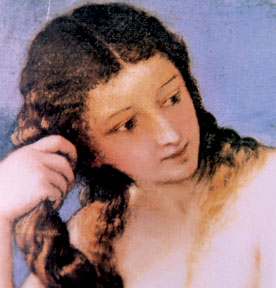Of hatred and jealousy in 'Winter's Tale'
By Gwen Herat
Wherever or whenever Shakespeare was able to 'clump-down' on a female
character, he never hesitated to do so. He saw them as homicidal,
suicidal, unfaithful, ambitious, revengeful etc.. This trait comes out
loud and clear in "Winter's Tale", the victim being Hermione, wife of
Leontes, King of Sicilia.
Written in 1611 and based in Bohemia and Sicilia, the tragedy brings
out the darker side of man and the power to do evil as and when he
wishes to.
 |
|
The innocent Queen Hermione, victim of
a great misunderstanding. |
The King of Bohemia, Polixenes, is a visitor for nine months at the
court of Leontes, King of Sicilia during which time, he suspects that
his Queen, Hermione had been unfaithful and their unborn child's father
to be Polixenes.
His rage is so furious that he plans to poison him through Camilio, a
Sicilian Lord. But Camilio who feels that Polixenes is innocent, warns
him of the impending danger. Immediately, their guest departs for
Bohemia.
Leontes orders his wife to be thrown in to prison and their elder
child, Memillius removed from her care. Distraught, she gives birth to
her second son in prison. Pauline brings the babe to Leontes in the hope
that it will move his heart. Instead, he commands Antigonus, Paulina's
husband, to abandon the 'bastard by Polixenes in some desert.
At the trial of Hermione:
Leontes 'Read the Indictment'
Officer (reads); Hermione, Queen to the worthy Leontes, King of
Sicilia thou art here accused and arraigned of high treason; in
committing adultery with Polixenes, King of Bohemia and conspiring with
Camillio to take away the life of our sovereign lord the King, thy Royal
husband; the pretence where of being by circumstances partly laid open;
thou Hermione, contrary to the faith and allegiance of a true subject,
didn't counsel and aid them, for their better safely, to fly away by
night' (ACT III, Scene I)
Arrives a massages from the Delphic oracle to declare the Queen's
innocence. Leontes who refuse to credit it, is taken aback when he is
informed of the death of his young son, Mamilius. Hermione faints and is
carried away. Later, Paulina enters and announces that his Queen is
dead.
In repentance, the king vows a life - long mourning. In the meantime,
Antigonus leaves the babe in Bohemian shores with the name he gave her (Perdita)
and gold in bundle. Then he vanishes. A shepherd and his son find the
child and decide to adopt her.
Sixteen years later, the play develops into a highly strung love
affair and moves with speed. Shakespeare had made this play into two
stories with the same characters surfacing to make it exciting.
From hatred and revenge, he turns it into compassion, love and trust.
In Bohemia:
They are come
Your mother was most true to wedlock, Prince
For she did print your royal father off.
Conceiving you, Were I but twenty-one
Your father's image is so hit in you
His very air, that I should call you brother
As I did him and speak of something wildly.
By us performed before, most dearly welcome.....
ACT. V. Scene.1
Florizel is in love with Perdita who has been brought up as a
shepherdess. She is sixteen years of age and a remarkable young woman of
great beauty. At a sheep-shearing feast, King Polixenes disguised and
along with Camillio, threaten to disinherit his son if he continued to
love Perdita. He also warns Perdita that she will put to death if they
do not leave each other. However, Camillio advises them to go to Sicilia
and tell Polixenes in the hope of a reconciliation. Shepherd and Clown
with their proofs of Perdita's discovery leave for Sicilia where after
many a heart-burn, Leontes and Polixenes are reconciled and bless their
children, Florizel and Perdita. They all leave for Paulina's chapel to
see the remarkable 'statue' of Hermione. Kissing it, Leontes finds that
after all these years, his wife is still alive, long cared for by
Paulina.
Winter's Tale, a unlike shakespeare's other plays, was less popular
on stage. It did not appear for over a century before 1741 when it was
boarded at Convent Garden. Under the title of Florizel and Perdita, this
play was staged Drury Lane 1756 in two Acts. The Thespian, Sarah Siddons
was Hermione and as Perdita (double acting) at the Lyceum in 1887. Many
versions followed until revival in 1955 at the Royal Shakespeare Centre.
Christopher Plummer was Leontes at the stratford - ontario version in
1958.
|

